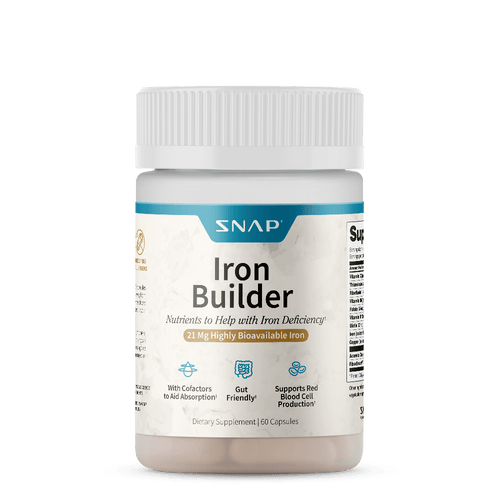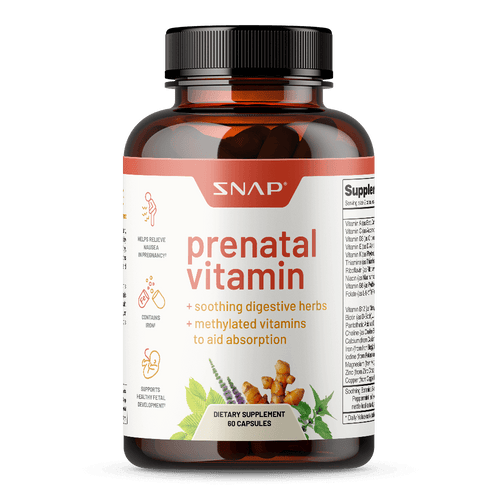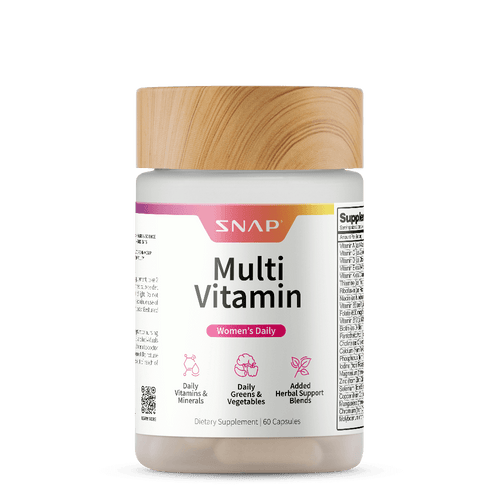What’s involved in prenatal care?
Preparing for the birth of your child there are million’s of things to think about and plan for. Getting the nursery ready, shopping for strollers and baby monitors.
Interviewing Obstetricians, touring birth centers….ultrasounds. But physically preparing for a birth actually happens before conception.
For the body to fall pregnant, there needs to be a slew of health considerations, ovulatory patterns, sperm counts, and of course, stars aligning.
On a metabolic level, there are basic nutrient requirements for the body to be primed to conceive. And for that, your Obstetrician, or primary healthcare provider might suggest a series of singular nutrients, or, a prenatal multivitamin.

Does nutrition really make a difference?
Yes it does. Being of a healthy weight is a primary consideration for preparing for pregnancy. Obesity can decrease your chances of conception, because excess weight can negatively effect your hormones and can prevent your ovaries from releasing an egg (ovulation), and similarly, being well underweight can also create problems falling pregnant.
What you put into your body can also play a role in prenatal care. There are essential nutrients that the body needs to create ovulatory patterns, and, prepare eggs for insemination, as well as prepare embryos for growth and babies last journey.
Nutrients such as zinc, folate, iron and vitamin D are all required in adequate amounts for perspective moms. Perhaps you are someone who eats on the go, your diet is lacking diversity, or, you regularly eat fast or processed foods, which are vacuuous nutrition wise.

Iron Builder
$28.00
$33.00
Or, you are someone who eats whole foods, have a varied diet and eating alot of fruits and seasonal vegetables, babies tend to take everything from mom, and sometimes there’s not alot left to keep up your energy and focus throughout the day.
Then taking a multivitamin to help bridge nutritional gaps is a good idea. A prenatal is regularly suggested by health care providers for both women who are pregnant, and, those who are looking to fall pregnant.
What should you look for in a prenatal multivitamin?
There are so many prenatal vitamins on the market, it’s hard to know what to look for, or which one to choose! For any multivitamin, there is a rule of thumb when scanning the supplement facts panel.
There should be all of the essential vitamins and minerals in there, and all at the RDI. The RDI, or, Recommended Daily Intake (or allowance), is a set level of individual nutrient values recommended per day by the Food and Drug Administration.
There is a set criteria for pregnancy and lactation, which considers the extra biological needs during this time. Taking a prenatal that delivers the required nutrients at the RDI will ensure you are getting adequate amounts.
Folic acid, or, folate, is an essential nutrient as it promotes healthy fetal development. Make sure when looking for a Prenatal Multivitamin that it includes 100% RDI for Folate.
Another key nutrient to look out for in a prenatal multivitamin is Iron. If your iron levels are low before pregnancy, you will experience enhanced fatigue and lack of focus throughout your pregnancy. Taking a multivitamin that has iron in it can address any deficiencies and ensure adequate levels throughout pregnancy and post delivery.

Is vitamins and minerals all you need?
There are many categories of botanicals that are beneficial to your health. Some botanicals contain antioxidant chemicals that can support healthy inflammatory response, and reduce free radical damage.
Other botanicals provide gentle nurturing actions to help sooth and calm your nervous system. If you are having issues around nausea during pregnancy, then taking a prenatal that addresses those symptoms with targeted botanicals can offer alot more in the way of pregnancy support beyond nutritional offerings.
Botanicals that have traditionally been used throughout pregnancy and have shown promise in clinical trials to help reduce nausea in pregnancy include ginger and peppermint. Taking a prenatal that considers the whole body, including botanials that encourage healthy digestive function is an added bonus also.

Prenatal Multivitamin
$31.00
$36.00
Should I take a prenatal for the whole pregnancy?
Prenatal multivitamins ideally can be taken in preparation of conception, all the way through pregnancy.
For after delivery, switching to a postnatal multivitamin that distinguishes the change in your bodies needs, and, adds nutrients to support healthy lactation can ensure continued nutritional gaps are filled, and, promote healthy recovery from birth.
Should my partner be taking a supplement too?
For couples who are planning to conceive, it is beneficial that both parties ensure their nutritional status is adequate.
Zinc is especially important for mens reproductive health. Taking a mens multivitamin that includes RDI of zinc can help bridge any nutritional gaps.

Women's Multivitamin
$27.00
$32.00
What else can I do to prepare for pregnancy?
There are several things you can do to prepare the body for conception and a healthy pregnancy.
Your healthcare provider will be able to assist with an exhaustive list, however, below is some considerations when you and your support system are considering taking the next step.
- Alcohol consumption - alcohol consumption has shown to reduce baby weight and negatively impact fetal development. As part of preconception care, taking a drink in moderation approach can help keep your liver healthy, and, make for a smoother transition to abstinence once you conceive.
- Exercise - it’s well understood that exercising is excellent for your health. And this is especially true when you fall pregnant. Exercising throughout your pregnancy can help you stay in shape, and prepare you physically for the delivery and post birth recovery. Regular moderate exercise with a mix of stretching, aerobic and anaerobic exercise at least several times a week is recommended in the first 2 trimesters. With strengthening and less vigorous gentler forms of exercise in the last trimester.
- Eat whole fresh foods - avoid processed foods that are high in saturated fats and refined sugars, but instead lean into plant forward fresh fruits, vegetables and whole grain foods. Lean protein, ideally organic, and locally raised (or wild caught) will make sure you are eating the freshest foods available for the season. This will positively impact both your nutritional intake, and help give you energy and promote healthy weight.
- Sleep - getting adequate sleep is critical for preconception, pregnancy and post delivery. After birth, your sleep will be disrupted regularly, perhaps for months. So, getting a solid 8 hours of sleep per night grants your endocrine system the rest it needs for healthy hormone production.
- Caffeine - caffeine is a stimulant, and one that can both dehydrate you and keep your nerves on edge. During pregnancy it is advised to keep caffeine intake at a minimum, so, in preparation for pregnancy, easing off the caffeine, or, go off it altogether before you become pregnant can help reduce symptoms of withdrawal like headaches or mood swings during pregnancy.
- Hydrate - drinking enough water through the day is imperative to stay hydrated during pregnancy. Water is essential for a baby's growth and development, and can help if mom is experiencing lethargy, heartburn, indigestion, headache, dizziness, fatigue, and constipation.
- Prenatal care - talk to your healthcare provider and secure an obstetrician if you are planning for pregnancy, or as soon as you know you are pregnant. Bring your family and friends in to your plans. Having a strong support network, both medical and emotional can make a huge difference to your experience and allow you to share your fears and hopes in a safe environment.
Having a child and experiencing pregnancy is a wondrous time, taking steps to prepare physically can both improve your changes of conception, and, promote a healthier pregnancy and recovery for both mother and baby.
—---------------------------------------------------------------
Amanda Lovett-Jones is an Australian Naturopath, and practices in the US as a registered Herbalist and culinary medicine specialist. She is a freelance copywriter and compliance specialist within the dietary supplement industry. She owns a virtual natural therapies wellness clinic that targets and helps treat inflammation using complementary medicine and diet. She lives with her family in Seattle.